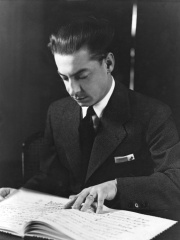
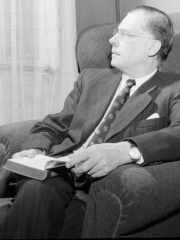
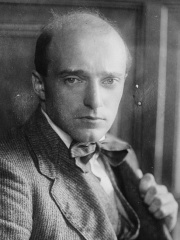
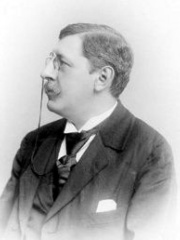
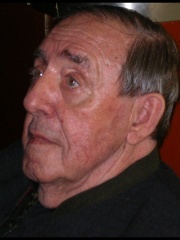
The Most Famous
CONDUCTORS from Austria
This page contains a list of the greatest Austrian Conductors. The pantheon dataset contains 128 Conductors, 6 of which were born in Austria. This makes Austria the birth place of the 7th most number of Conductors behind United States, and Finland.
Top 6
The following people are considered by Pantheon to be the most legendary Austrian Conductors of all time. This list of famous Austrian Conductors is sorted by HPI (Historical Popularity Index), a metric that aggregates information on a biography's online popularity.

1. Herbert von Karajan (1908 - 1989)
With an HPI of 79.60, Herbert von Karajan is the most famous Austrian Conductor. His biography has been translated into 67 different languages on wikipedia.
Herbert von Karajan (German: [ˈhɛʁbɛʁt fɔn ˈka(ː)ʁajan] ; born Heribert Adolf Ernst Karajan; 5 April 1908 – 16 July 1989) was an Austrian conductor. He was principal conductor of the Berlin Philharmonic for 34 years. During the Nazi era, he debuted at the Salzburg Festival, with the Vienna Philharmonic, the Berlin Philharmonic, and during World War II he conducted at the Berlin State Opera. Generally regarded as one of the greatest conductors of the 20th century, he was a controversial but dominant figure in European classical music from the mid-1950s until his death. Part of the reason for this was the large number of recordings he made and their prominence during his lifetime. By one estimate, he sold 200 million records.

2. Karl Böhm (1894 - 1981)
With an HPI of 71.63, Karl Böhm is the 2nd most famous Austrian Conductor. His biography has been translated into 34 different languages.
Karl August Leopold Böhm (28 August 1894 – 14 August 1981) was an Austrian conductor. He was best known for his performances of the music of Mozart, Wagner, and Richard Strauss.

3. Erich Kleiber (1890 - 1956)
With an HPI of 65.92, Erich Kleiber is the 3rd most famous Austrian Conductor. His biography has been translated into 25 different languages.
Erich Kleiber (5 August 1890 – 27 January 1956) was an Austrian, later Argentine, conductor, known for his interpretations of the Western classics and as an advocate of Neue Musik. Kleiber was born in Vienna, and after studying at the Prague Conservatory, he followed the traditional route for an aspiring conductor in German-speaking countries of the time, starting as a répétiteur in an opera house and moving into conducting in increasingly senior positions. After holding posts in Darmstadt (1912), Barmen-Elberfeld (1919), Düsseldorf (1921) and Mannheim (1922) he was appointed in 1923 to the important post of musical director of the Berlin State Opera. In Berlin, Kleiber's scrupulous musicianship and enterprising programming won him a high reputation, but after the Nazi Party came to power in Germany in 1933, he resigned in protest against its oppressive policies, and left the country, basing himself and his family in Buenos Aires. For the rest of his career he was a freelance, guest conducting internationally in opera houses and concert halls. He played an important part in the creation of The Royal Opera in London, but a plan for him to return to the Berlin State Opera in the 1950s fell foul of politics. Kleiber was regarded as an outstanding conductor of Mozart, Beethoven and Richard Strauss and encouraged modern composers, including Alban Berg, whose Wozzeck he premiered. He died suddenly in Zürich at the age of 65.

4. Felix Mottl (1856 - 1911)
With an HPI of 60.42, Felix Mottl is the 4th most famous Austrian Conductor. His biography has been translated into 21 different languages.
Felix Josef von Mottl (between 29 July/29 August 1856 – 2 July 1911) was an Austrian conductor and composer. He was regarded as one of the most brilliant conductors of his day. He composed three operas, of which Agnes Bernauer (Weimar, 1880) was the most successful, as well as a string quartet and numerous songs and other music. His orchestration of Richard Wagner's "Wesendonck Lieder" is still the most commonly performed version. He was also a teacher, and his pupils included Ernest van Dyck and Wilhelm Petersen.
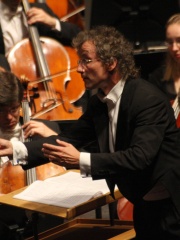
5. Franz Welser-Möst (b. 1960)
With an HPI of 59.62, Franz Welser-Möst is the 5th most famous Austrian Conductor. His biography has been translated into 26 different languages.
Franz Leopold Maria Möst (born 16 August 1960), known professionally as Franz Welser-Möst, is an Austrian conductor. He is currently music director of the Cleveland Orchestra.

6. Otmar Suitner (1922 - 2010)
With an HPI of 58.08, Otmar Suitner is the 6th most famous Austrian Conductor. His biography has been translated into 16 different languages.
Otmar Suitner (German pronunciation: [ˈɔtmaʁ zuˈiːtnɐ]; 16 May 1922 – 8 January 2010) was an Austrian conductor who spent most of his professional career in East Germany. He was born in Innsbruck and died in Berlin. He was principal conductor of the Staatskapelle Dresden from 1960 to 1964, and then music director at the Berlin State Opera in East Berlin from 1964 to 1990. He was concurrently chief conductor of the Staatskapelle Berlin from 1964 to 1991. (It has been common practice that the same conductor is responsible for leading both institutions.) A fairly prolific recording artist, he was particularly notable in Austro-German music, having conducted discs of works by Max Reger and Paul Hindemith as well as the first Beethoven symphony cycle to be released on compact disc. He taught at the Mozarteum for twenty years. From 1977 to 1990 Suitner was professor of conducting at the University of Music and Performing Arts Vienna. Among his prize students was American conductor Donald Covert, who received the "Swarovsky Conducting Diploma" in 1984. He was awarded the National Prize of the German Democratic Republic, 2nd Class for art and literature, in 1963. In East Berlin, Suitner was married to Marita Wilckens (1924–2008), daughter of the composer Friedrich Wilckens. In 1965 he became acquainted with the West German student Renate Heitzmann and had a son, Igor, with her in 1975 in West Berlin. Igor produced a documentary in 2007 about his father, A Father's Music.
People
Pantheon has 6 people classified as Austrian conductors born between 1856 and 1960. Of these 6, 1 (16.67%) of them are still alive today. The most famous living Austrian conductors include Franz Welser-Möst. The most famous deceased Austrian conductors include Herbert von Karajan, Karl Böhm, and Erich Kleiber.
Living Austrian Conductors
Go to all RankingsDeceased Austrian Conductors
Go to all RankingsHerbert von Karajan
1908 - 1989
HPI: 79.60
Karl Böhm
1894 - 1981
HPI: 71.63
Erich Kleiber
1890 - 1956
HPI: 65.92
Felix Mottl
1856 - 1911
HPI: 60.42
Otmar Suitner
1922 - 2010
HPI: 58.08
Overlapping Lives
Which Conductors were alive at the same time? This visualization shows the lifespans of the 5 most globally memorable Conductors since 1700.

